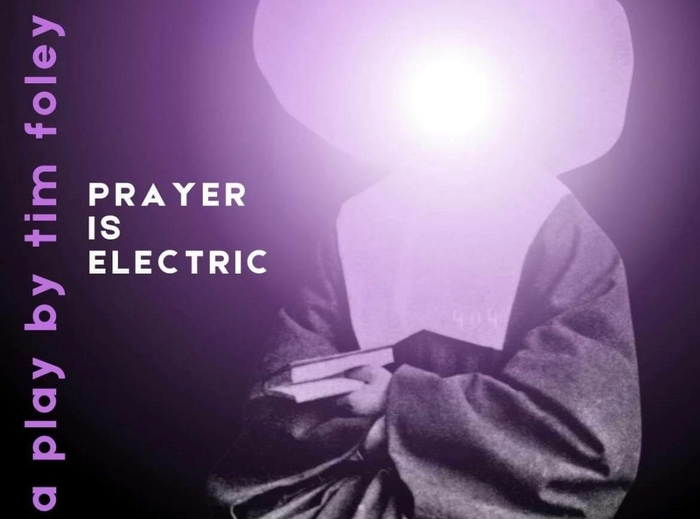80s pop and robot nuns galore in ‘Electric Rosary’
Progression meets tradition in this thought provoking play, featuring detailed direction and complex performances

Could ChatGPT write a homily? Would you go to confession with a chatbot? Adapting to the changes brought about by technology is a struggle for everyone, let alone an institution as ancient as the Catholic Church. Set in a convent undergoing some serious political upheaval, Electric Rosary is about what happens when modernity and tradition collide.
The world of Electric Rosary is one even more technologically dependent than our own, with robotic workers both a fact of life and a contentious political topic. The sisters’ Father Ted-esque peaceful life of evening prayer and morning mass is upended by the arrival of Mary (Charlie Scott-Haynes) as the convent’s first robotic nun.
Scott-Haynes captures the uncanniness of the not-quite-human with her subtle, robotic twitches and line delivery evocative of the peculiar intonation we associate with auto-generated robot dialogue, like listening to Alexa or a satnav. Mary is seemingly all-knowing, almost omnipotent, and as she herself points out, perfect. Technology sometimes seems as close to God as we can get, so the contrast here is a fitting one.
“A carefully considered and lovingly crafted production”
Mary’s dubious humanity is telegraphed through wardrobe changes. When she first arrives, her purple dress makes her visually distinct from the nuns in their pure white habits; in the show’s final scene, representing the peak of her humanity, she takes on a more dishevelled appearance, her messy hair upending the mechanical perfection of earlier scenes.
Sophie Campbell’s clever use of accessories allows the personalities of the sisters to shine, despite their near-identical habits: Theresa (Flossie Adrian), a novice nun who is the most accepting of tech, wears headphones around their neck; Phillipa (Melania Hamilton) sports leopard print ugg boots to reflect her more ordinary life before the convent.
The performances from the ensemble cast gave every sister a strong individuality, which is no small feat — it would be easy to portray the nuns in a dismissive and stereotypical manner. Sister Constance (Edith Stewart) shades severity with dignity and solemnity; her stillness in most scenes creates a strong contrast with Adrian’s performance as Theresa which sees them scurrying frantically about the stage.
The liveliness of the sisters makes even more pertinent the cool, mechanical behaviour of Mary, reinforcing her otherness once again. As the story progresses and Mary becomes more human, her behaviour converges with the other sisters, challenging the audience’s idea of what it means to be human after all.
The staging in many scenes is creative — some see characters circling a point on stage, monologuing in turns, creating a montage effect. The closing scene, in which the staging alludes to Michelangelo’s Madonna della Pietà, is particularly strong and demonstrates a true commitment to the religious themes underpinning the show. These high points are marred by less successfully blocked scenes in which actors seem to mill about the stage aimlessly, which makes moments that had the potential to be tense and action-packed feel static.
Electric Rosary is a revival of Tim Foley’s play and has some pacing problems which are by no means the fault of the actors or director. The action escalates suddenly near the end, via a confrontation with the anti-tech townspeople. But unsatisfyingly this confrontation happens entirely off stage, despite being the driving force of tension for much of the latter half of the show.
Nonetheless, Raffaella Sero’s interpretation is a deeply engaging one and showcases immense care for the source material and the issues surrounding the faith it’s based on. This is especially evident in details like Liam Macmillan’s sound design: a catchy soundtrack of 80s pop hits whose apparent religious allusions are brought out by their placement in contrast with the convent. Every detail feels so delicately calculated that the very name of the singer Madonna takes on additional meaning.
Electric Rosary is a carefully considered and lovingly crafted production whose take on the relationship between tradition and technology is most enlightening.
Electric Rosary is showing at the Corpus Playrooms, Tuesday 14th to Saturday 18th February, 7pm
 News / Uni Scout and Guide Club affirms trans inclusion 12 December 2025
News / Uni Scout and Guide Club affirms trans inclusion 12 December 2025 News / Cambridge Vet School gets lifeline year to stay accredited28 November 2025
News / Cambridge Vet School gets lifeline year to stay accredited28 November 2025 Science / Did your ex trip on King’s Parade? The science behind the ‘ick’12 December 2025
Science / Did your ex trip on King’s Parade? The science behind the ‘ick’12 December 2025 News / Cambridge study finds students learn better with notes than AI13 December 2025
News / Cambridge study finds students learn better with notes than AI13 December 2025 News / Pembroke to convert listed office building into accom9 December 2025
News / Pembroke to convert listed office building into accom9 December 2025








